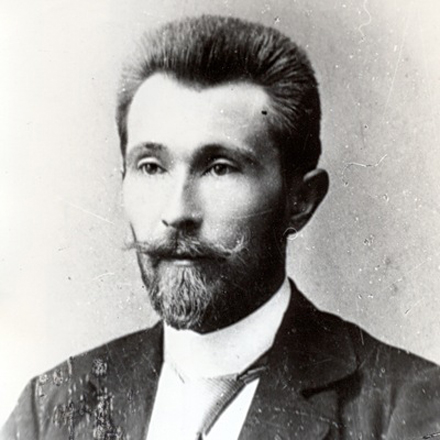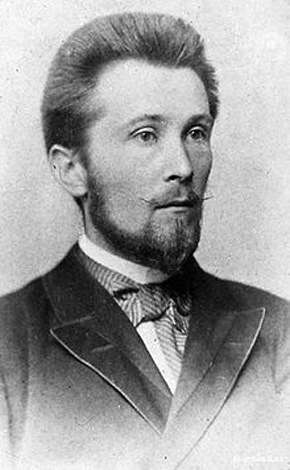Hnatiuk, Volodymyr
Hnatiuk, Volodymyr [Hnatjuk], b 9 May 1871 in Velesniv, Buchach county, Galicia, d 6 October 1926 in Lviv. (Photo: Volodymyr Hnatiuk.) Noted Slavic ethnographer, literary scholar, translator, journalist, and community figure in Western Ukraine; member of the Shevchenko Scientific Society (NTSh) in Lviv from 1899, the Imperial Academy of Sciences in Saint Petersburg from 1902, the Czechoslavic Ethnographical Society in Prague from 1905, the Society for Austrian Folk Art in Vienna, the Folklore Fellows in Helsinki, and the VUAN and the Ethnographic Society in Kyiv from 1924. Hnatiuk began collecting folklore during his adolescence. He studied at Lviv University (1894–8), where he headed the Academic Hromada (Lviv); his mentors there—Mykhailo Hrushevsky and Ivan Franko—became his close lifelong collaborators. From 1898 to his death he was the general secretary of NTSh. In 1898 he was elected secretary, and in 1913 chairman, of the Ethnographic Commission of the Shevchenko Scientific Society. From 1899 he was also the secretary of the NTSh Philological Section. Hnatiuk was also an editor of and contributor to several NTSh serials: Khronika NTSh (66 issues in Ukrainian, 59 in German), Etnohrafichnyi zbirnyk (ez, 22 vols), and Materiialy do ukraïns’koï etnolohiï (20 vols). While he was its general secretary, the NTSh reached the peak of its development, becoming the equivalent of an academy of sciences.
Hnatiuk also served two terms (1899–1906, 1922–6) on the editorial board of the journal Literaturno-naukovyi vistnyk, for which he solicited many contributions and wrote many articles and reviews on literary, political, and linguistic topics. He also contributed to Zapysky Naukovoho tovarystva im. Shevchenka, Kievskaia starina, Zhytie i slovo, Dilo, and other Ukrainian, as well as German, Polish, and Czech, periodicals. One of the founders (in 1899), the secretary (1899–1912), and a director of the Ukrainian-Ruthenian Publishing Company, he edited over 150 of its volumes of Ukrainian and European literature, translating many of the foreign works himself. He was also an active member of the Lviv Prosvita society.
Hnatiuk maintained extensive contacts with almost all important Ukrainian and many non-Ukrainian scholars and cultural figures. Together with Ivan Franko and Fedir Vovk, he was instrumental in turning folklore collecting in Western Ukraine into a scholarly discipline; he wrote many programs and methodological guidelines for collectors, and in his Ukraïns’ka narodna slovesnist’ (Ukrainian Folk Literature, 1916) he presented a system for recording, classifying, and publishing Ukrainian folklore. Hnatiuk's research was focused initially on the Hungarian-ruled Ukrainians. He made five research trips (during 1895–6, 1899, 1903) to Transcarpathia and one each to Bačka (1897) and the Banat (1903), and wrote over 100 studies of their folklore, material culture, and dialects; the most important study is Etnohrafichni materiialy z Uhors’koï Rusy (Ethnographic Materials from Hungarian Ruthenia, vols 3, 4, 9, 25, 29, and 30 [1897–1911] of ez). Between 1899 and 1914 he spent many summers in the Hutsul region, where he conducted ethnographic research among its inhabitants and collected many artifacts for the NTSh museum. After falling ill with tuberculosis in 1903, Hnatiuk could not engage in much fieldwork; instead he organized a correspondence network of about 800 folklorists, with whose help he compiled over two dozen unsurpassed volumes of materials that were published in the NTSh serials edited by him and in the collection Das Geschlechtsleben des Ukrainischen Bauernvolkes (2 vols, 1909, 1912).
Hnatiuk was an advocate of the comparative-historical approach, which he applied in his studies of folktales, fables, folk songs, legends, folk beliefs, and folk customs and rites. He also wrote valuable works about folk cookery, handicrafts, folk oral literature, folk architecture, demonology, and folkways. His writings on various Ukrainian dialects and argots and on normative grammar and orthography were important contributions in the field of Ukrainian linguistics. In the political sphere, Hnatiuk supported the Ukrainian Radical party and was an opponent of the Galician Russophiles and populists (see Western Ukrainian Populism).
In 1969 an ethnographic-memorial museum dedicated to Hnatiuk was opened in Velesniv; in 1971 a memorial sculpted by Luka Bihanych was erected there. A monument to him was also raised at his grave at the Lychakiv Cemetery in Lviv.
BIBLIOGRAPHY
Iatsenko, M. Volodymyr Hnatiuk (zhyttia i fol’klorystychna diial’nist’) (Kyiv 1964)
Mushynka, M. Volodymyr Hnatiuk—doslidnyk folkl’oru Zakarpattia. Vol 190 of ZNTSh (Paris–Munich 1975)
Romanenchuk, B. (ed). Volodymyr Hnatiuk: Vybrani statti pro narodnu tvorchist’. Na 110-richchia narodzhennia, 1871–1981. Vol 201 of ZNTSh (New York 1981)
Mushynka, M. Bibliohrafiia drukovanykh prats’ Volodymyra Hnatiuka (Edmonton 1987)
Dashkevych, Ya. (ed). Volodymyr Hnatiuk: dokumenty i materiialy (1871–1989) (Lviv 1998)
Mykola Mushynka
[This article originally appeared in the Encyclopedia of Ukraine, vol. 2 (1989).]

.jpg)
